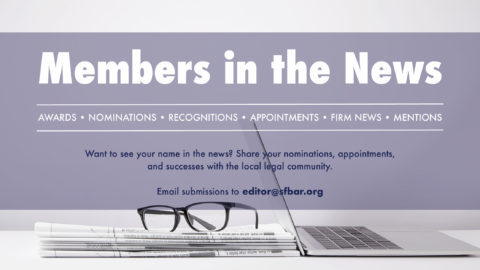 On June 3 The Bar Association of San Francisco’s Barristers Club hosted the “Summer Business Development Boost: It’s Your Minute” program to help, among others, young attorneys perfect their “elevator” pitch.
On June 3 The Bar Association of San Francisco’s Barristers Club hosted the “Summer Business Development Boost: It’s Your Minute” program to help, among others, young attorneys perfect their “elevator” pitch.
Keynote speaker Brian Rashid, J.D. shared useful tips to help attorneys distinguish themselves in today’s saturated legal market.
Important Questions to Ask When Crafting Your Story
When preparing to craft a one-minute presentation, Rashid explained that you must ask yourself the following questions:
Who are you talking to?
This question should be asked in a broader sense encompassing the context of the conversation. For example, certain aspects of your one-minute story should be left out in a networking event that you would otherwise share in an interview. Common sense should guide this determination.
What do they care about?
Preparation is the key to answering this question. Before an interview, for example, ample time should be given to researching the interviewing organization. At a networking event, you should have an idea of the people who will be present.
What do you want from them/ Why do you want to do this?
The answer to this question helps to connect the many facets of the one-minute presentation. This is where goals of the target audience and the speaker’s must align.
Elevate
Rashid stressed the need to elevate your pitch from the many others who are vying for the target audience’s time. To elevate means to tell your story in a way that separates you from the crowd. It is not enough to tell your story in outline form; instead, connect the facts together to form an underlying theme. Go further by connecting the theme of your story to the target’s goal.
Your story has to translate into bringing value to the organization. The organization is not interested in how much it can help you. When crafting your one-minute presentation, think of John F. Kennedy’s famous words and then adjust them slightly: Ask not what your target audience can do for you — ask what you can do for your target audience. Lastly, as it pertains to elevate, ask yourself the following question: Is my story the same as everyone else’s? If your answer is yes, then you must elevate!
Create
When answering the important questions, be sure to give examples of things you have created. Ask yourself: What was not there before I came along and is there now because of me? Give as many of these examples as possible. And when talking about creation, always bring up numbers to illustrate your point. Numbers help place an image in the target’s mind.
Permission to Boast and a Promise Worth Keeping
Today, societal expectations demand that a person downplay her/his accomplishments. We are conditioned to be humble. However, downplaying one’s own accomplishments will have the effect of setting you back instead of setting you apart. Drawing from conversations he had with partners at law firms, Rashid explained that the more assertive candidates usually are the more successful they are in securing employment. In an effort to help audience members be more assertive, he wrapped up the program by having the audience make the following promise: I deserve to share my story in the most compelling way!
 About Brian Rashid
About Brian Rashid
Brian Rashid is a highly sought after motivational speaker and message expert who assists professionals in varying fields by helping them tailor and deliver a message that resonates with their target audience. Brian graduated from City University of New York (CUNY) School of Law. Among his many impressive achievements, Brian wrote speeches for Mayor Bloomberg’s Administration in New York City.
About the author:
Ahmad Azizi Esq. is a new attorney who graduated with honors from UC Hastings College of the Law. He is interested in transactional law with a focus on healthcare. Currently, Mr. Azizi is working as a publications assistant at the Bar Association of San Francisco.





0 comments on “Making The Most of Your Sixty Seconds: Crafting Your Personal Elevator Pitch”